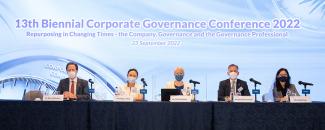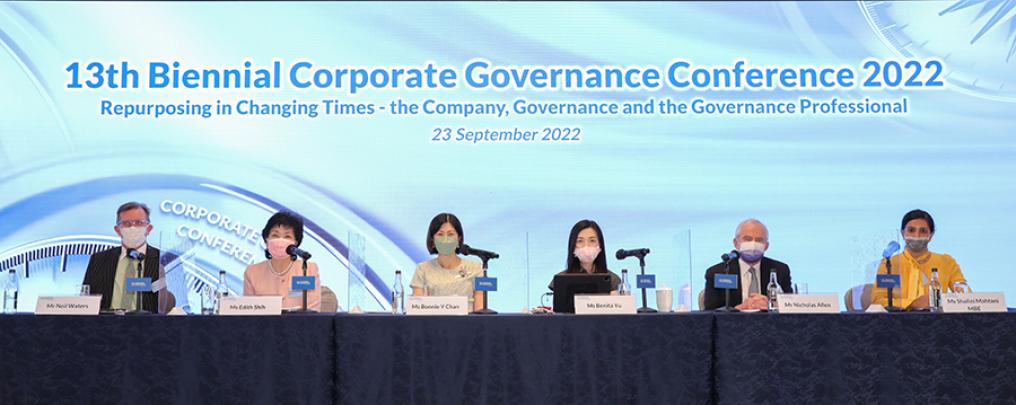Under the theme, Repurposing in Changing Times – the Company, Governance and the Governance Professional, the Institute’s latest Corporate Governance Conference (CGC) explored the way governance needs to be ‘repurposed’ to be part of the solution to the many challenges facing our world. This first part of our review of the conference focuses on the key takeaways from session one of the forum, which focused on the urgent need to address climate change.
A consistent theme of the Institute’s latest CGC was that business as usual is no longer an option. In particular, across a range of issues, including climate change plans, sustainable development, diversity and inclusion, ethical leadership, stakeholder inclusivity and corporate culture, companies need to prepare for a much less forgiving stakeholder and regulatory environment.
In this context, session one of the conference addressed the first of those issues mentioned above – the urgent need for companies to come up with credible climate action plans. In the emerging business environment, investors, customers and regulators are less likely to be impressed by lofty aspirations and vague pledges on climate change – the focus will be on what measurable targets have been set and how much measurable progress has been made towards those targets.
The first speaker of this session, David Simmonds FCG HKFCG, Institute Vice-President and Chief Strategy, Sustainability and Governance Officer, CLP Holdings Ltd, issued a call for action by businesses in response to climate change, and gave his assessment of the critical role that governance, and governance professionals, must play in helping companies to navigate the challenges of this issue.
He started his presentation with a slide showing that the market capitalisation of Tesla is greater now than the combined market capitalisation of most of the world’s major vehicle manufacturers. ‘There is probably no more powerful representation of the rewards from climate than this,’ he said. Tesla, he added, is reaping the rewards for building a product – electric vehicles – that is purpose built to respond to climate change. ‘Too often the rewards for action on climate get overlooked in the face of the very obvious challenges associated with addressing this issue,’ he said.
In addition, companies with solid credentials on climate change will reap significant advantages from being better aligned with investor expectations. ‘Capital is moving, we have seen an absolute sea change in the attitude of investors in relation to climate action over the last three to five years and the flow of funds into sustainable investments is growing rapidly,’ he said.
They will also be better aligned with the expectations of other stakeholders – customers are increasingly looking for greener alternatives and companies with a good track record on climate change are associated with much a greater ability to attract and retain staff.
The role of governance
The climate emergency has a direct relevance for both the board of directors and governance generally. Mr Simmonds pointed out, however, that traditional governance frameworks are often not well suited to deal with this issue. ‘The lens through which most organisations address climate change, at least initially, is either through compliance or risk. Compliance leads to a reporting that is generally backward-looking. When it comes to risk, most enterprise risk management frameworks have a field of vision of two to three years at most. The problem with climate change is that the material risks for most organisations will manifest over a longer time horizon,’ he said. For this reason, CLP has established a Sustainability Committee of the board with a remit specifically to consider the longer-term issues affecting the company, both in terms of the risks and the opportunities.
Mr Simmonds highlighted a number of other ‘modest tweaks’ to governance frameworks and board processes that can make a material difference. An obvious one is to ensure that recruitment and training practices provide both board and management with the necessary skills and experience to make the right decisions on an issue as complex as climate change. That doesn’t necessarily have to mean recruiting climate experts to join the board, Mr Simmonds said, but he recommended periodic expert briefings on the impacts of climate change on the company.
He also suggested that businesses can consider restructuring executive roles. His own role, for example, covers strategy, sustainability and governance, and that allows for the necessary integration of sustainability into the firm’s corporate strategy. Climate change, together with developments in technology and many other transformative trends, requires organisations to adapt their traditional business models and processes. This is not only to manage the risks, but also, more importantly, to find the opportunities that spring from the shifts in economic activity that are occurring through these trends.
Another key consideration, Mr Simmonds said, was the need to stay on top of these trends as they develop. He therefore recommended refreshing the board regularly. ‘You can’t hope to effectively govern for these sorts of shifts if you don’t refresh your board regularly,’ he added. ‘And that does not mean simply recruiting younger versions of essentially the same people to join your board. The refresh is a good opportunity to bring in the sort of diversity of thought, experience and skills that is going to be helpful in navigating these challenges.’
The role of governance professionals
The scale of the changes that will be needed to successfully address climate change will require the concerted efforts of many different players. Among them, however, the governance professional has a special role to play.
‘There is a huge opportunity here for us as governance professionals,’ Mr Simmonds said. Governance professionals are not alone, of course, in seeking to influence boards on climate issues. Sustainability experts and ESG practitioners, for example, are well placed to play an advocacy role. However, while they certainly have the technical knowledge and skills to understand the complexity of the issues at stake, they don’t always have knowledge and experience of how boards work, and how decisions are made, to effectively influence the board decision-making process.
‘As governance professionals, you will have that in spades,’ Mr Simmonds said. ‘So if you take the time to learn about the impact of climate on your business, where the risks and opportunities are, you can play a really powerful role in helping your company navigate through the challenges and towards the rewards.’
He concluded by emphasising the urgency for governance professionals to rise to this opportunity. ‘I know a number of you as governance professionals see your role, at least in part, as being the guardian of the board. With CEOs and directors losing their jobs over climate change – the time to act is now.’
The impending regulatory imperative
The second speaker in the first session was Teresa Ko JP BBS FCG HKFCG, Senior Partner, Hong Kong, and China Chairman, Freshfields Bruckhaus Deringer, and Co-Vice-Chair of the IFRS Foundation. With her experience as a trustee of the IFRS Foundation, Ms Ko was the ideal speaker to update CGC participants on the likely impacts in Hong Kong of the much anticipated new sustainability standards about to be launched by the International Sustainability Standards Board (ISSB). See the second cover story in this edition of CGj for her views on this issue.
The ISSB was launched last year by the IFRS Foundation to develop a global baseline of sustainability-related disclosures. In March this year, the ISSB published its first two exposure drafts, namely S1 on general sustainability-related financial information and S2 on climate-related disclosures. These developments might seem remote from Hong Kong, but regulators here have already signalled their intention to align Hong Kong’s local regulatory requirements with the ISSB standards.
Megan Tang, Senior Director, Corporate Finance Division, Securities and Futures Commission, Hong Kong, a panellist in session one, confirmed that one of the major policy initiatives that the Securities and Futures Commission (SFC)’s Corporate Finance Division has been working on this year is how to introduce ISSB-aligned reporting requirements for Hong Kong–listed issuers. ‘We at the SFC have been working closely with the stock exchange on the draft listing rules for implementing the ISSB global baseline reporting standards,’ she said.
She confirmed that the aim is to launch a public consultation soon after the ISSB publishes the final S2 standard on climate-related disclosures. A series of soft consultations with listed companies, investors and market professional associations has already been held to solicit feedback on the implementation of the new rules. Through its work at The International Organization of Securities Commissions (IOSCO), the SFC has also been engaged in the international dialogue to promote Hong Kong’s perspectives. The SFC also engages in informal dialogue with other capital market regulators – including those in the Mainland and the US – on what they’re doing in their jurisdictions.
Ms Tang said the aim was to develop a robust but flexible regime. ‘We understand the very real challenges that listed companies face in making this transition, but, having said that, the end game is inevitable. Major jurisdictions around the world are all moving to adopt and implement reporting requirements based on the global baseline standard. What we need to do is to work out a framework and a roadmap to help support companies to align their reporting practices and keep pace with evolving international practices while providing the flexibility that they need in this process,’ she said.
The likely impact of tougher regulations on climate reporting in Hong Kong was a focus of the panel discussion at the end of session one. Panellists agreed that the tougher regulations discussed above will be the most important factor in kickstarting change in Hong Kong. Responding to a question by Panel Chair, Gillian Meller FCG HKFCG(PE), Institute Immediate Past President, and Legal and Governance Director, MTR Corporation Ltd, there was a general consensus that regulators are the stakeholder group having the most influence on the climate change plans of Hong Kong companies. While investor and customer expectations are also driving change, tougher regulations are going to have the most immediate influence in terms of getting climate-related issues higher on company agendas, panellists agreed.
‘It’s unrealistic to expect private enterprise to voluntarily implement the necessary changes within the timeframe we have,’ said Ben McQuhae, Founder, Ben McQuhae & Co, and Co-founder, Hong Kong Green Finance Association. ‘Smart regulation is probably therefore the only way to accelerate action in the way we need to see happening. That said, we all need to collaborate because no one organisation or institution has all the answers. We have to pool our experience and energy to develop the necessary solutions,’ he added.
Are Hong Kong companies ready?
The panel discussion also addressed the preparedness of Hong Kong companies for the impending regulatory requirements relating to climate reporting. Mr McQuhae, for example, pointed out that the ISSB standards will require reporting on Scope 3 greenhouse gas (GHG) emissions. Between now and 2035, therefore, all Hong Kong listed companies will need to start planning and preparing for reporting on Scope 3 emissions. This will be a challenge since companies will need to capture data from the full extent of their supply chains. ‘I suspect that few companies in Hong Kong currently have that sort of the data collection ability,’ he said.
Eddie Ng, Partner, Business Reporting and Sustainability, KPMG China, agreed with this assessment and added that companies need therefore to recognise the urgency of starting on that journey. She pointed out the advantages for companies who start preparations for Scope 3 reporting now, before the expected rules are implemented. ‘There’s an advantage in being the first mover,’ she said. ‘Companies that are already thinking about how to do it, or experimenting with ways to do it, will have the advantage of setting the standard for the industry.’
Another aspect of climate reporting that may be part of the new requirements is scenario planning and this too will be unfamiliar to most companies in Hong Kong. Mr Simmonds pointed out, however, that globally a huge amount of investment is going into technology solutions that will help companies get up to speed in this area. ‘Since other markets are going through these changes ahead of us, we will have their experience to go by when choosing the right tools,’ he said.
The last word
The concluding address at the Institute’s CGC 2022 was given by Professor Mervyn King SC, Chairman Emeritus, The International Integrated Reporting Council. Professor King, a regular speaker at the Institute’s CGCs, provided a broad historical and ethical context to the issues discussed earlier in the day. As Event Chair, Peter Greenwood FCG HKFCG, pointed out in his introduction to the concluding address, the transition from financial capitalism to inclusive capitalism and from a shareholder to a stakeholder focus has a long and interesting history. Professor King reminded participants of that history and provided the broad social and historical context from which the current trend towards more sustainable capital markets has come.
The Institute’s CGC 2022 was held in hybrid mode on 23 September 2022 at the JW Marriott Hotel. The CGj review of the forum will be in two parts, published in this and the following edition of the journal.



